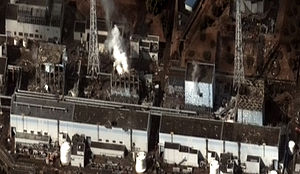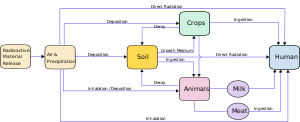
Back حوادث نووية وإشعاعية Arabic Nüvə qəzaları Azerbaijani Радыяцыйная аварыя BE-X-OLD Nuklearna nesreća BS Accident nuclear Catalan Jaderná havárie Czech Kernekraftulykke Danish Accidente nuclear Spanish Istripu nuklear Basque Ydinonnettomuus Finnish



A nuclear and radiation accident is defined by the International Atomic Energy Agency (IAEA) as "an event that has led to significant consequences to people, the environment or the facility." Examples include lethal effects to individuals, large radioactivity release to the environment, or a reactor core melt.[6] The prime example of a "major nuclear accident" is one in which a reactor core is damaged and significant amounts of radioactive isotopes are released, such as in the Chernobyl disaster in 1986 and Fukushima nuclear disaster in 2011.[7]
The impact of nuclear accidents has been a topic of debate since the first nuclear reactors were constructed in 1954 and has been a key factor in public concern about nuclear facilities.[8] Technical measures to reduce the risk of accidents or to minimize the amount of radioactivity released to the environment have been adopted, however human error remains, and "there have been many accidents with varying impacts as well near misses and incidents".[8][9] As of 2014, there have been more than 100 serious nuclear accidents and incidents from the use of nuclear power. Fifty-seven accidents or severe incidents have occurred since the Chernobyl disaster, and about 60% of all nuclear-related accidents/severe incidents have occurred in the USA.[10] Serious nuclear power plant accidents include the Fukushima nuclear disaster (2011), the Chernobyl disaster (1986), the Three Mile Island accident (1979), and the SL-1 accident (1961).[11] Nuclear power accidents can involve loss of life and large monetary costs for remediation work.[12]
Nuclear submarine accidents include the K-19 (1961), K-11 (1965), K-27 (1968), K-140 (1968), K-429 (1970), K-222 (1980), and K-431 (1985)[11][13][14] accidents. Serious radiation incidents/accidents include the Kyshtym disaster, the Windscale fire, the radiotherapy accident in Costa Rica,[15] the radiotherapy accident in Zaragoza,[16] the radiation accident in Morocco,[17] the Goiania accident,[18] the radiation accident in Mexico City, the Samut Prakan radiation accident, and the Mayapuri radiological accident in India.[19]
The IAEA maintains a website reporting recent nuclear accidents.[20]
In 2020, the WHO stated that "Lessons learned from past radiological and nuclear accidents have demonstrated that the mental health and psychosocial consequences can outweigh the direct physical health impacts of radiation exposure."[21]"
- ^ "SOURCES, EFFECTS AND RISKS OF IONIZING RADIATION: UNSCEAR 2013 Report" (PDF). Unscea.org. Retrieved 12 March 2019.
- ^ Richard Schiffman (12 March 2013). "Two years on, America hasn't learned lessons of Fukushima nuclear disaster". The Guardian.
- ^ Martin Fackler (June 1, 2011). "Report Finds Japan Underestimated Tsunami Danger". The New York Times.
- ^ "Regulator OKs safety report on Kashiwazaki-Kariwa units - World Nuclear News". World-nuclear-news.org. Retrieved 12 March 2019.
- ^ "IAEA Team to Report on Kashiwazaki Kariwa Nuclear Power Plant Examination" (PDF). Iaea.org. Retrieved 12 March 2019.
- ^ International Nuclear and Radiological Events Scale Users' Manual, 2008 Edition (PDF). Vienna, Austria: International Atomic Energy Agency. p. 183. Archived from the original (PDF) on May 15, 2011. Retrieved 2010-07-26.
- ^ Yablokov, Alexey V.; Nesterenko, Vassily B.; Nesterenko, Alexey (2009). Sherman-Nevinger, Jannette D. (ed.). Chernobyl: Consequences of the Catastrophe for People and the Environment. Boston, MA: Blackwell Publishing for the Annals of the New York Academy of Sciences. ISBN 978-1-57331-757-3. Retrieved 11 June 2016.
- ^ a b M.V. Ramana. Nuclear Power: Economic, Safety, Health, and Environmental Issues of Near-Term Technologies, Annual Review of Environment and Resources, 2009, 34, p. 136.
- ^ Matthew Wald (February 29, 2012). "The Nuclear Ups and Downs of 2011". The New York Times.
- ^ Cite error: The named reference
critevwas invoked but never defined (see the help page). - ^ Gralla, Fabienne, Abson, David J., and Muller, Anders, P. et al. "Nuclear accidents call for transdisciplinary energy research", Sustainability Science, January 2015.
- ^ Cite error: The named reference
epe2011was invoked but never defined (see the help page). - ^ Johnston, Robert (September 23, 2007). "Deadliest radiation accidents and other events causing radiation casualties". Database of Radiological Incidents and Related Events.
- ^ Gusev, Igor; Guskova, Angelina; Mettler, Fred A. (2001-03-28). Medical Management of Radiation Accidents, Second Edition. CRC Press. ISBN 978-1-4200-3719-7.
- ^ Strengthening the Safety of Radiation Sources p. 15.
- ^ "NRC: Information Notice No. 85-57: Lost Iridium-192 Source Resulting in the Death of Eight Persons in Morocco". Nrc.gov.
- ^ The Radiological Accident in Goiania p. 2, Pub.iaea.org
- ^ Pallava Bagla. "Radiation Accident a 'Wake-Up Call' For India's Scientific Community" Science, Vol. 328, 7 May 2010, p. 679.
- ^ "IAEA Scientific and Technical Publications of Special Interest". Pub.iaea.org. Archived from the original on 2017-05-03. Retrieved 2016-04-07.
- ^ "A framework for mental health and psychosocial support in radiological and nuclear emergencies".
© MMXXIII Rich X Search. We shall prevail. All rights reserved. Rich X Search